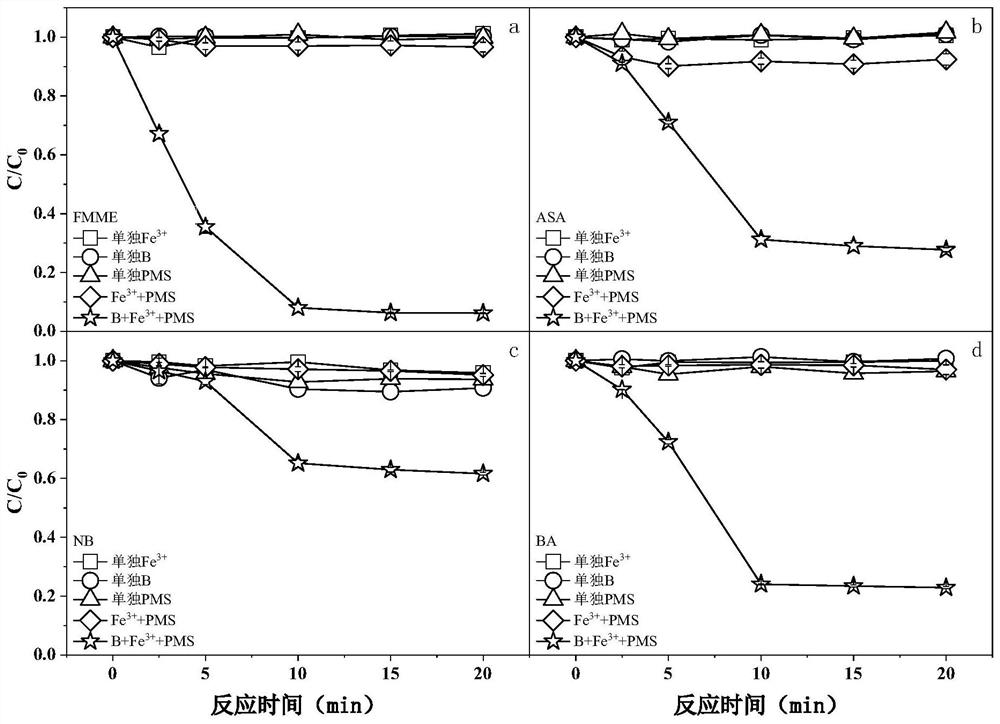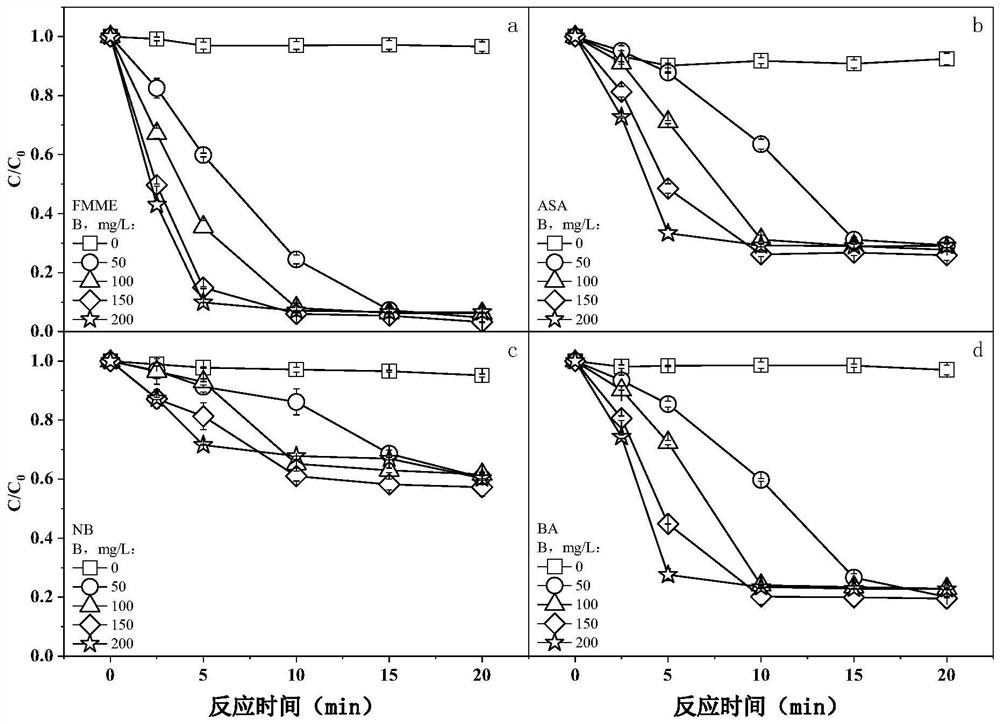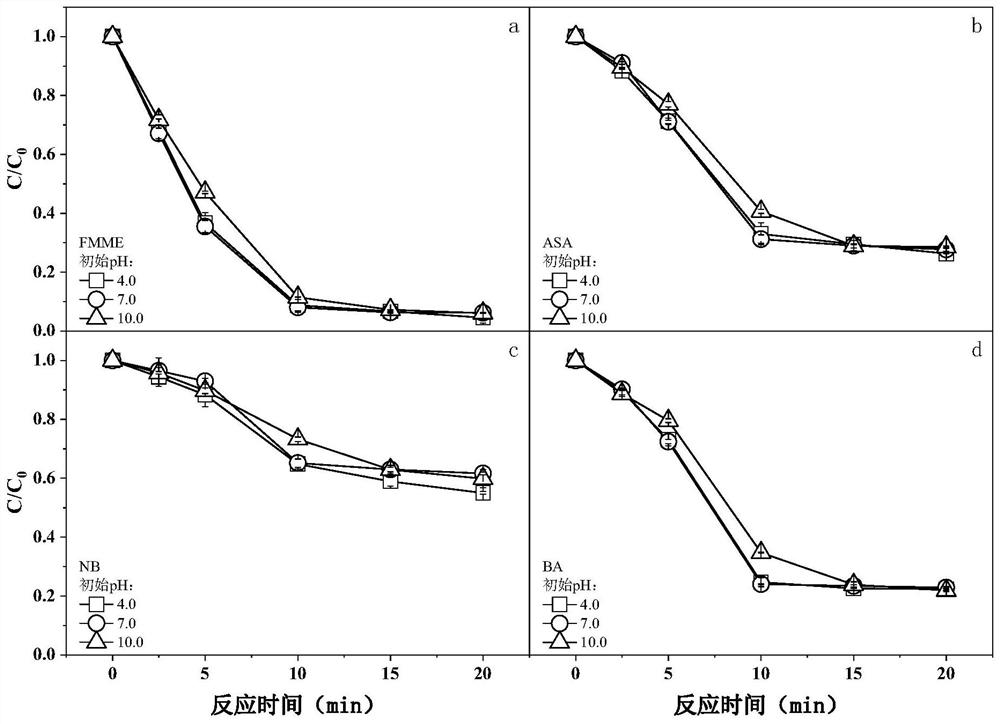Solid reagent bag for removing organic matters in wastewater, and application thereof
A technology of solid reagents and organic matter, applied in water pollutants, water/sewage treatment, special compound water treatment, etc., can solve problems such as easy decomposition, slow recovery rate of ferrous iron, and corrosiveness
- Summary
- Abstract
- Description
- Claims
- Application Information
AI Technical Summary
Problems solved by technology
Method used
Image
Examples
Embodiment 1
[0028] Fe Ⅲ Comparison experiment of the removal effect of four simulated pollutants by / PMS system:
[0029] 1) Take 250ml of FMME (flunixin meglumine) containing 5.92mg / L, 3.6mg / L of ASA (aspirin), 2.4mg / L of NB (nitrobenzene) and 2.4mg / L of BA (benzene Formic acid) solution in the brown reaction bottle, using 9.8g / L of H 2 SO 4 and 0.4g / L NaOH solution to adjust the pH value to 4.0, and the glass bottle was placed in a constant temperature shaker in a water bath to maintain a constant temperature of 25°C.
[0030] 2) Weigh the catalyst iron trichloride hexahydrate and 0.038g potassium hydrogen peroxymonosulfate with a preset mass of 0.034g, mix them evenly, and put them into a sealed bag to make a solid reagent for storage.
[0031]3) Add the solid reagent prepared in step 2) to the four brown reaction bottles in step 1), start the water bath constant temperature oscillator, and shake at a speed of 180rpm / min to fully react with the pollutants.
[0032] 4) Start timing ...
Embodiment 2
[0036] Fe Ⅲ Comparison experiment of the removal effect of four simulated pollutants after introducing crystalline boron into the / PMS system:
[0037] Embodiment 2 is the same as the experiment process of Embodiment 1, except that in step 2), the crystalline boron of 0.025g and 0.034g of ferric chloride hexahydrate and 0.038g of peroxymonohydrogensulfate are also taken in step 2). Potassium blends made into new solid reagent packs.
[0038] The experimental results measured as figure 1 Shown, C-B / Fe Ⅲ The 20min removal rate of FMME / PMS system was 93.8%, 72.3% of ASA, 77.1% of BA, and 38.4% of NB. Compared with the result of Example 1, it can be known that C-B / Fe Ⅲ The removal rate of the four pollutants by the / PMS system was significantly higher than that of Fe Ⅲ / PMS system, so in Fe Ⅲ The introduction of crystalline boron into the / PMS system can efficiently promote the circulation of Fe, and improve the removal effect of pollutants by accelerating the generation rat...
Embodiment 3
[0040] Embodiment 3 is the same as the experimental process of embodiment 1, and the difference is that the dosage of boron is used as an independent variable to explore the C-B / Fe Ⅲ / PMS system to remove the effect of target pollutants, wherein the dosage of boron in step 2) is 0, 12.5, 25.0, 37.5, 50.0mg respectively.
[0041] In the five cases with different dosages of crystalline boron, C-B / Fe Ⅲ The relationship between the efficiency of the / PMS system to remove target pollutants and time is as follows: figure 2 It can be seen from the figure that the removal rate of the four pollutants FMME, ASA, NB, and BA increases first and then decreases with the increase of boron dosage, and the dosage is 150mg / Its 20min removal rate is the highest when L is 96.8%, 74.1%, 42.8%, 80.5% respectively, and the 20min removal rate of four pollutants is 93.8%, 72.3%, 38.4%, 77.1% when the amount of boron is 100mg / L %, considering the economy of boron and the toxicity of excess boron, s...
PUM
| Property | Measurement | Unit |
|---|---|---|
| particle size (mesh) | aaaaa | aaaaa |
Abstract
Description
Claims
Application Information
 Login to View More
Login to View More - R&D
- Intellectual Property
- Life Sciences
- Materials
- Tech Scout
- Unparalleled Data Quality
- Higher Quality Content
- 60% Fewer Hallucinations
Browse by: Latest US Patents, China's latest patents, Technical Efficacy Thesaurus, Application Domain, Technology Topic, Popular Technical Reports.
© 2025 PatSnap. All rights reserved.Legal|Privacy policy|Modern Slavery Act Transparency Statement|Sitemap|About US| Contact US: help@patsnap.com



